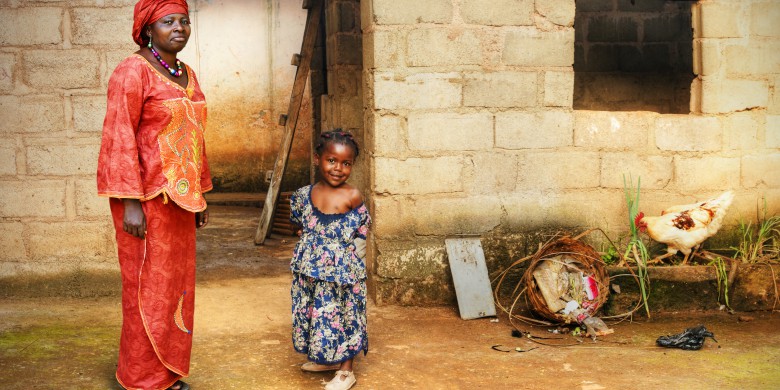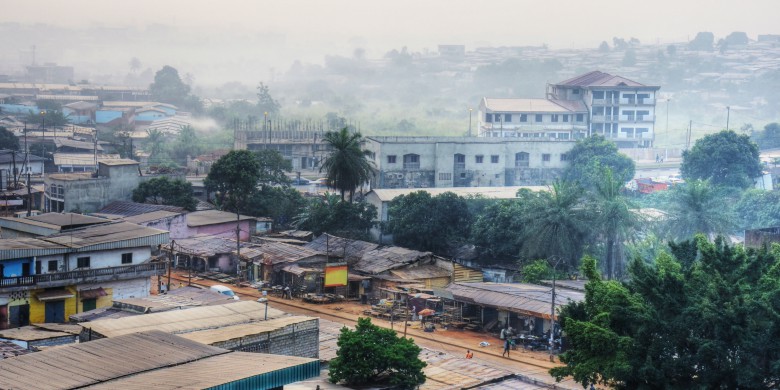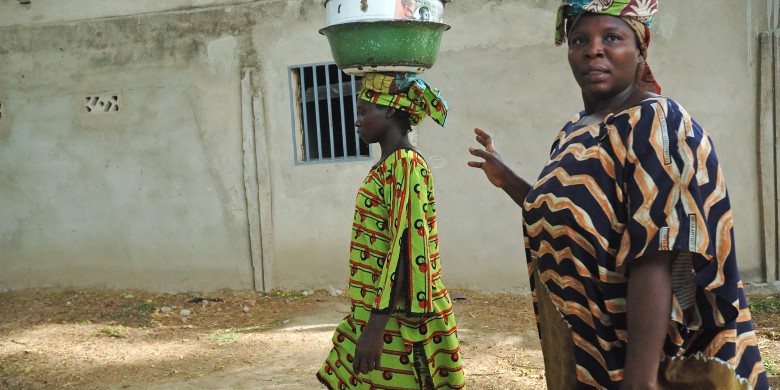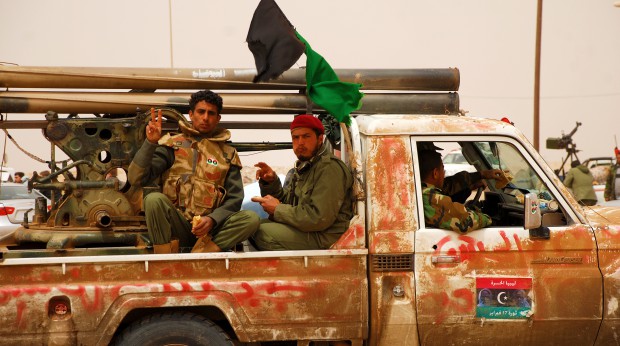
Fight like a Girl? The Toughest Battles in Cameroon are Fought by Women and Girls
At times of acute crisis, it is easy to lose sight of the bigger picture. A global pandemic, like the one we are facing today, is a perfect example of where our natural response is to focus solely on the aspects which are most acutely affected: a nation’s healthcare system and its economy. However, the trickle-down effect of COVID-19 can seriously affect other crucial areas of life, particularly peace and conflict.
CSPPS has launched this series of articles, which zooms in on the role of civil society in supporting local response action. Via interviews with frontline responders, we discuss the short-term and long-term effects that COVID-19 is having on prospects for peace and stability in their countries.
“After having fled Boko Haram, we came here for refuge. We saw how armed men entered our village at night. They set our houses on fires and we started to run. All of a sudden, they captured us, tortured us and threatened to kill us. We were repeatedly raped by several men. Nowadays, I just want to die. I feel like a walking cadaver. I have been rejected by my husband and by my family. I am already dead on the inside, and society looks at me differently since this has happened. I wanted to kill myself, but I told myself to pass this horrible story on to someone. Hopefully I will be remembered after my death, and people will develop strategies to prevent this kind of atrocity from happening again. So that nobody after me will have to live with this kind of shame, ever again.”
Anonymous testimony from a gender-based violence survivor from Cameroon shared with Association Rayons de Soleil by partner organisation ALDEPA, August 2018
Cameroon is a heavily patriarchal society, which treats women and girls as inferior to men in daily life. The latest UNDP Gender Inequality Index ranks Cameroon 150th among a total of 189 classified countries. This is nine places lower than the previous year, indicating how the status of women and girls has been in a downward spiral.
Fidèle Djebba, president of Association Rayons de Soleil, and CSPPS member in Cameroon, founded her organisation, which works to empower women and girls, in 2006. Her initial aim was to support young and vulnerable girls who faced a myriad of issues that are common in Cameroon and prevented them from developing equally to their male peers or from becoming independent. She focused on issues such as child marriage, lack of access to education or girls who did not obtain birth certificates and who therefore never had official identities. However, as her organisation’s work progressed, they became more involved in the security issues of the Far North, where jihadist group Boko Haram terrorises local communities, as well as other critical areas of conflict.
For the sixth article of this series (read more here), the CSPPS Secretariat had a valuable conversation with Djebba, for which she kindly saved her battery as she had had no electricity for four days prior to the interview. An inconvenience - to say the very least - which is far from unusual in Cameroon. As our conversation progressed, the pervasiveness of gender inequality within Cameroonian society became harshly apparent, as well as the manner in which COVID-19 is magnifying the gap between women and men.
According to a report on gender equality in Cameroon by Gender Standby Capacity Project, half of the female population lives below the poverty line, whereas only a quarter of men do. This inequality is equally reflected in the ownership of assets: only 3% of Cameroonian women own a house. In terms of education, boys generally have greater access, which subsequently leads to enhanced prospects of economic and social independence. Furthermore, teenage pregnancy is also concerning: 10% of girls aged 15 to 19 have already given birth in Cameroon.
Although already particularly vulnerable, adolescents now face even greater risks of getting married off before the age of 18. Before the pandemic, a third of Cameroonian girls under 18 were forced to marry, with conflict-affected regions consistently featuring higher rates of child marriage than the more stable areas. Owing to the pandemic, there is a greater risk of parents forcing their daughters into marriage as a way to secure their daughters’ positions in an increasingly unstable society, as well as to reduce their own costs by simply having fewer mouths to feed.
Nonetheless, even though marriage is perceived as a way of securing a girl or a woman’s livelihood as well as position in society, sexual violence within the domestic sphere is another threat to their security. Nationwide in Cameroon, 20% of women were forced during their first sexual experience. In total, 56% of married women have experienced sexual violence, whether in their own households or by others in wider society. Domestic violence is not punishable by law, and marital rape therefore constitutes a major risk to women in Cameroon. As a result of the growing conflict, both in the Far North as well as regarding the Cameroonian Civil War, sexual violence is on the rise.
Threatened by armed groups, the military, members of their own family, community leaders or members from wider society, women and girls face the reality of sexual violence on a daily basis. However, men and boys are occasionally subjected to those same horrors, too. Of all reported cases of sexual violence, 11% of victims are male. Similarly to marital rape, male-on-male rape is not punishable by law. Therefore, survivors of either crime are at all times left unprotected by the law. For now, until Cameroon changes its penal code for the protection of the unprotected, the only way these crimes can be legally prosecuted is by appealing on a basis of “forced homosexuality” in the case of men, or on the basis of forced marriage for women.
Pile on a crisis like COVID-19 onto a country already heavily affected by an ongoing civil war, as well as by the deadly presence of Boko Haram in the Far North, and you have a recipe for disaster. Unfortunately, as always, women and girls are the ones who pay the highest price.
“Although there are thousands of women’s organisations up in the Far North of Cameroon, less than 10 of them work for the cause of development, in the long-term. Women do support each other in Cameroon, but often on a smaller scale. Such groups meet once a month, and they collect money for the members among them that struggle most. But the bigger picture, that of sustainable development and gender equality, is one step too far for them. Not because they do not want to, but because it is another, unobtainable level for them to deal with, in their already harrowing situation. That is why we do what we do. We push for gender equality on a national level, where others cannot.”
Cameroon, just like all of the countries discussed in this series, faces many threats to its national stability and sustainable development, not in the least in terms of peace and conflict. And despite proof of women’s critical contributions to peace processes in the past, women remain severely underrepresented at the negotiating table. According to research, the participation of women in the peace process makes a peace agreement 64% less likely to fail. Moreover, when women are included in the peace process, the resulting agreement is 35% more likely to last at least 15 years. Yet, between 1992 and 2018, women made up just 3% of mediators, 4% of signatories and 13% of negotiators in major peace processes.
Gender inequality in Cameroon is thus not only causing issues regarding the position of women and girls in society or the domestic sphere, or in terms of gender-based violence due to the ongoing conflict. The exclusion of women in positions of decision-making power is also affecting the prospect of peace for the entire country.
Since 2017, separatists in the English-speaking regions of Southern Cameroon have clashed with government forces, constituting the Cameroonian Civil War or, by another name, the Anglophone crisis. This conflict is said to have claimed over 3,000 lives, and to have displaced half a million people within Cameroon. An additional 40,000 Cameroonians have fled to neighbouring Nigeria, while more than 855,000 children forego education due to the conflict. The war has left one out of three people in the Anglophone region dependent on humanitarian aid, making them all the more vulnerable to COVID-19. Also in this conflict, women are disproportionately affected.

The Far North, where Boko Haram operates, is another story entirely. The jihadist group, which originates from neighbouring Nigeria, previously used the area primarily as a gateway for the trafficking of arms into Nigeria. But the group stepped up its insurgency under new leader Abubakar Shekau and began penetrating and extending armed attacks into Cameroon in 2014, after the leaders of France and several African countries, Cameroon included, announced at a summit in Paris that they would intensify their counterinsurgency operations against Boko Haram.
This made Cameroon the second most targeted country in terms of attacks in the Lake Chad basin, and tensions rose, resulting in a full-frontal clash between Boko Haram and the joint armed forces of Cameroon, Chad and Nigeria. Since the latter triumphed in that clash, attacks from Boko Haram have been less forceful but more frequent: suicide bombings, abductions and assassinations are nothing out of the ordinary in the Far North of Cameroon, which is also the country’s most impoverished region.
As women and girls are not immediately perceived as threats, Boko Haram uses them to circumvent government forces and function as messengers, smugglers, spies or recruiters. The perpetrators of suicide bombings are nowadays often women and young girls, for that very same reason. Girls as young as 10 are trained to be sent into crowded places to inflict as many casualties as possible by detonating themselves.
Djebba explains how poverty, not ideological conviction, is most often the reason why young boys and girls get recruited into the jihadist group. They receive small but significant remunerations for joining – that is, when they join voluntarily instead of getting abducted whilst gathering wood or working the fields, as abduction is a major means by which Boko Haram fills its ranks.

"I was barely 13 when one day my father came back from a trip, accompanied by a gentleman to marry me. I refused and my father left with him. A week later, a group of people arrived at my house at night. They took me away and we walked all night in a forest. In the early morning, my father and my little brother, who had disappeared for a few weeks, arrived where I was being held. I ran to hide behind my father, but he refused and instructed me to sit with his friend, whom he had brought previously to marry me. I never saw my father and brother again from that day on. I was married three times, from one man to another, and when the third husband also died, I was declared unlucky and had to die in order to follow my husbands. It was by a miracle that I was able to escape and live today. I have suffered many other things, and I continue to suffer".
Anonymous testimony from a gender-based violence survivor from Cameroon shared with Association Rayons de Soleil by partner organisation ALDEPA, August 2018
The COVID-19 crisis, which prevents whole families from earning their daily wages in the informal sector, amplifies their despair. Djebba explains how well over 70% of the population depends on daily income from the informal sector to subsist. The current situation sparks fear among the community, especially as women and girls can be recruited, abducted or forced to go into prostitution, either by their families or out of despair.
“If women and girls were not already vulnerable enough, COVID-19 is making this situation worse. And we at Association Rayons de Soleil are afraid that all the progress made so far by civil society organisations as well as the government will be lost because of it. The impact will be long-term. And we need to anticipate those long-term effects.”
In addition to their work with local communities and other civil society organisations, Association Rayons de Soleil advises the Ministry of Youth on its national policy. “In the fight against violent extremism, we need to engage the youth of Cameroon”, Djebba stresses. “Across the country, we have engaged several youth ambassadors who work against violent extremism and radicalisation, and towards sustainable peace. We involve them in the peace process as well, from the bottom up, as that is the only way to stop these things from happening in the future.” The UN-mandated Independent Progress Study on Youth, Peace and Security, which was published in 2018, indicates that the world’s 1.8 billion youths, who have mostly been excluded from peacebuilding and development processes, are an important ‘missing peace’ on the path towards stability and sustainable peace worldwide.
When considering gender-based violence and gender inequality, especially during COVID-19, Djebba explains how even more young girls and women, especially the ones that were displaced due to the Anglophone Crisis, are now forced into prostitution. In their desperation, selling their bodies for money is their only solution. “Women and girls working in the informal sector as small business owners are now struggling to make a living during the pandemic. They do not have many other options to provide for themselves and their families”, Djebba says. Clearly, the predicament women and girls are in is only deepening as a consequence of the pandemic.
"It was one night in 2015 (...) A group of ten men, six of them armed, entered our house. They started taking our belongings. They took us outside and forced us to follow them into the bush. When we arrived at the place where they were camping, they assigned us husbands and those who refused were locked up in a kind of cage. Afterwards, they forced us to convert to Islam, and those who refused were threatened with death. One of them who had chosen me as his wife kept me in the bush for seven months, during which he raped me whenever he felt like it. One night, when they had gone to another village, we were able to escape and come back here. Life was not easy. We suffered from starvation and lived through many other horrible things.”
Anonymous testimony from a gender-based violence survivor from Cameroon shared with Association Rayons de Soleil by partner organisation ALDEPA, August 2018
In a survey that Association Rayons de Soleil conducted among 200 women over the past weeks, 60% of respondents indicated that their relationship with their partner has become more difficult because of the measures taken against COVID-19. Although domestic violence remains a taboo in Cameroon, many indicated that their partners have grown more frustrated, and thus, more aggressive, physically as well as mentally.
The loss of employment and income due to COVID-19 has led to an increased amount of frustration among the men, many of whom have indicated that they feel incapacitated, or even emasculated, as they can no longer fulfil their traditional role of primary breadwinner. On the other hand, men do not aid women with housework, even though these responsibilities have become more burdensome since children no longer attend school, as housework is culturally not perceived as a task for men. This leaves women charged both with taking care of the home as well as generating the family’s income.
Amid COVID-19 and the many facets of conflict in a patriarchal society, women and girls are disproportionately affected. Under normal circumstances, they already depend on male-controlled resources and assets, and consistently have less decision-making power in the domestic sphere, in wider society and in government. In strictly patriarchal Cameroon, religion and culture dictate the roles and status women can – but mostly cannot – assume.
The separation of adult women and men in many daily customs is far from unusual, not just in Cameroon, but in many patriarchal societies, which only perpetuates the instilled sense of gender inequality. Sexual and gender-based violence are the most horrifying symptoms of this divide between women and men, and even more so as conflict engulfs the country. However, the exclusion of women in peacebuilding and statebuilding processes also impedes their contributions to sustainable peace, despite their demonstrated effectiveness.

“Last October, we trained 44 volunteers enabling them to provide psycho-social support to their communities as well as workshops and awareness-raising about gender equality, but now also for COVID-19. Those volunteers are well-equipped to run local activities, also in areas that we ourselves cannot reach right now because of the pandemic,” Djebba says. “Those people are in their own communities, also in the villages in the region of the Far North. They have been campaigning and informing their communities for the last two months, as well as distributing masks and hand sanitisers, with the help of local donors. Luckily, our work continues to pay off through them, as they can continue what we started. But yes, our activities as a civil society organisation are impacted, because of COVID-19. But we do what we can. As always.”
Organisations like Djebba’s Association Rayons de Soleil continue to work, within the limitations on their movement, gatherings, and even access to electricity, towards a more equal and peaceful Cameroon. Yet, COVID-19 is setting the country back immensely and the means to ameliorate the situation amid this chaos are few.
After all, in a situation such as that of Cameroon’s female population, what is the better option for the most vulnerable among them? For some, it is a matter of choosing between the lesser of two evils: either being tortured, threatened and raped on a daily basis by Boko Haram, or the escape of death by suicide, as part of one of their terrorist attacks. Another dilemma some women are faced with is the choice between seeing their families grow hungry and frustrated as their daily income has disappeared because of the pandemic or going into prostitution to be able to provide for themselves and their loved ones. Situations of conflict, exacerbated by COVID-19, confront the most vulnerable of people worldwide with impossible choices to make.
These dilemmas do occur and impose themselves on a daily basis. In Cameroon, but also in many other countries across the globe. Why do women and girls still bear the brunt of all crises that humanity faces? Whether it is a war, a pandemic, or ‘simply’ the patriarchy, women and girls almost always end up paying the highest price.
At last year’s Open Debate on Women, Peace and Security in the UN Security Council, UN Secretary-General António Guterres said: “The Women, Peace and Security agenda is clearly one of the top priorities of the United Nations as a whole. We see this in the adoption of a great many resolutions by the Security Council, including the landmark resolution 1325 and its many follow-up decisions. …. Given such strong support and common understanding, an observer might be forgiven for thinking that things are substantially improving. But the sad fact is – and we must be blunt about it – the commitment that is always reflected around this table is not translating into real change around the world. It is not coming fast enough or far enough. Change is coming at a pace that is too slow for the women and girls whose lives depend on it, and for the effectiveness of our efforts to maintain international peace and security.”
Throughout this series of articles, we have considered the impact of COVID-19 on the world’s most vulnerable nations. When fighting this global pandemic, especially in fragile and conflict-affected settings, we cannot forget the most vulnerable: women and girls. According to UNICEF, 650 million women and girls alive today were married as children, often impeding their chances at an education and making it more likely that they experience domestic violence. The preamble of the Cameroonian constitution enshrines gender equality in a number of ways, but the patriarchal dimensions of culture, conflict and society continue to impede women’s and girl’s chances to an equal position within their society, sexually, socially, as well as economically. Change is coming, verbally, but where are the actions? When do we start protecting the ones that need it most, in both word and deed?
CSPPS reiterates the importance of a whole-of-society, conflict-sensitive response to COVID-19, in order to protect all who are vulnerable. Especially women and girls. We believe that including women and youth in the peacebuilding and statebuilding process will critically improve the prospect of a truly sustainable peace worldwide. Empowering women and youth will allow everyone to thrive and will provide the globe with all the capacities that are currently already present, yet unnurtured. We praise and continue to support the work done by our member Association Rayons de Soleil in Cameroon, as well as that by many other civil society organisations and institutions around the world and call upon everyone to proactively take on the toughest battle towards an equal and peaceful world. Fight like a girl? Maybe we all should.
Article by Charlotte de Harder - CSPPS

